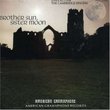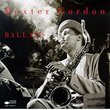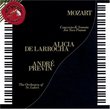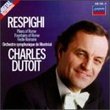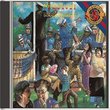| All Artists: Johannes Brahms, Leonard Bernstein, New York Philharmonic, André Watts Title: The Royal Edition - Brahms: Piano Concerto no 2 Members Wishing: 0 Total Copies: 0 Label: Sony Original Release Date: 1/1/1992 Re-Release Date: 7/28/1992 Genre: Classical Styles: Forms & Genres, Concertos, Instruments, Keyboard Number of Discs: 1 SwapaCD Credits: 1 UPC: 074644753929 |
Search - Johannes Brahms, Leonard Bernstein, New York Philharmonic :: The Royal Edition - Brahms: Piano Concerto no 2
 | Johannes Brahms, Leonard Bernstein, New York Philharmonic The Royal Edition - Brahms: Piano Concerto no 2 Genre: Classical
|
Larger Image |
CD DetailsSimilarly Requested CDs
|
CD ReviewsWatts, Bernstein, And Brahms Erik North | San Gabriel, CA USA | 12/15/2003 (5 out of 5 stars) "The Second Piano Concerto of Brahms, which the composer wrote a quarter of a century after No. 1, is perhaps the longest of its type in the active repertoire, coming in at just over fifty minutes. It takes a great deal of skill to navigate this sizeable work. Andre Watts is the pianist with that kind of skill, as is aptly demonstrated in this 1968 recording of the concerto with Leonard Bernstein and the New York Philharmonic. Watts and Bernstein make for a good partnership here; and Watts' own playing, particularly in the tricky and violent scherzo and the almost Mozartean final movement, is superlative. Bernstein's conducting and the performance by the New York Philharmonic is at its world-class best.Rounding out this recording is Bernstein's 1971 essay of the work that gave Brahms the impetus to work on symphonic essays--the "Variations On A Theme By Haydn." Although it has been established that the theme Brahms thought to be by Franz Joseph Haydn (supposedly from a wind divertimento in B Flat) is probably by someone else, that does not diminish the popularity of this twenty minute-long work. As usual with Bernstein's golden years with the New York Philharmonic, his interpretation of the Haydn Variations is top-notch.Highly recommended for all classical music lovers." Excellent "Sleeper" Choice Erik North | 05/02/2002 (4 out of 5 stars) "Bernstein and Watts here turn in a subtle, nuanced performance of Brahms' 2nd Piano Concerto. The NY Phil under Bernstein's direction provides excellent accompaniment. Watts doesn't proceed with reckless abandon - tempos are relaxed except for the second movement, where Bernstein and Watts move things up a notch. Watts' playing highlights the lyricism and underspoken points of the piano part. Balance between soloist and orchestra is excellent and, overall, the sound quality is generally good for a recording made at Avery Fisher in 1968.The Haydn Variations make a nice filler and are also played with the same lyricism evident in the Concerto. This particular disc is not one often mentioned in the same breath as Fleischer/Szell, Gilels/Jochum, and Pollini/Abbado, but it definitely has something to offer. Brahmsians take note!" The young Watts is bold but not mature enough Santa Fe Listener | Santa Fe, NM USA | 01/22/2008 (4 out of 5 stars) "Andre Watsts was only 22 when he recored this Brhams Second Cto. with Bernstein, and althoughhe possesses reserves of technique -- one never feels that the thorny keyboard writing overwhelms him -- he hasn't got much to say. There aren't many ideas, and after a while I lost interest, beyond admiring what a young virtuoso can do (I very well remember his TV debut on one of Bernstein's YOung Person's Concerts). Sadly, Watts never grew very much artisticaly. I heard him preform the same concerto in Carnegie Hall last year under Eschenbach with the Philadelphia Orch., and Watts seemed rather faceless then. It's a shame that Bernstein, who always had a deep sympathy for Brahms, didn't find a partner in his HY Phil. years to equal his vivid, imaginative accompaniment.
On his own LB gives us the Haydn Variations, and it's a breath of fresh air compared to the traditional german approach, which tends to be pompous and even churchy. Bernstein's interpretation is fresh and quick in its pacing, and the usual wide-ranging sonics favored by Columbia's engineers adds to the sweep of the music." |

 Track Listings (14) - Disc #1
Track Listings (14) - Disc #1